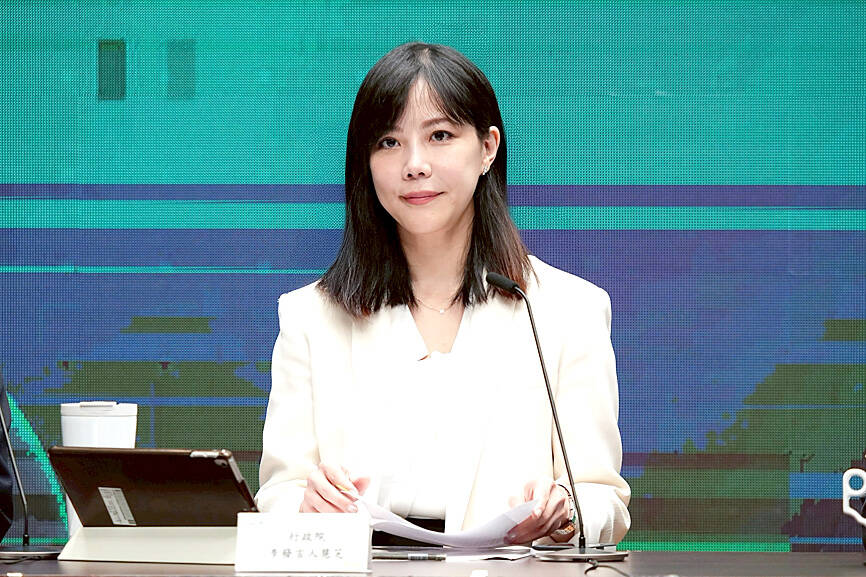The government would soon review measures in place to test civil servants’ loyalty to the country, particularly measures that should be administered to those who have access to highly classified information, the Executive Yuan said yesterday.
The issue has been under close scrutiny following a series of highly publicized espionage cases, including one involving Democratic Progressive Party (DPP) member Ho Jen-chieh (何仁傑), who has been detained and held incommunicado since Saturday for allegedly spying for China while serving as assistant to then-minister of foreign affairs Joseph Wu (吳釗燮).
President William Lai (賴清德) on Wednesday told a meeting of the DPP Central Standing Committee that party officials must from now on report their trips to China, Hong Kong and Macau prior to departure.

Photo courtesy of the Executive Yuan
Mainland Affairs Council Deputy Minister Liang Wen-chieh (梁文傑) also told a news conference in Taipei on Wednesday that the council is proposing an amendment to the Act Governing Relations Between the People of the Taiwan Area and the Mainland Area (臺灣地區與大陸地區人民關係條例) that would regulate legislators’ visits to China.
Although the act stipulates that people engaging in business involving national security or confidential matters in agencies related to national defense, foreign affairs, technology, intelligence, mainland affairs or other related agencies should apply for permission to enter China, legislators have never abided by the rule, Liang said.
At the weekly Cabinet meeting yesterday, Premier Cho Jung-tai (卓榮泰) also asked Minister Without Portfolio Ma Yung-cheng (馬永成) to meet with national security officials and propose within two weeks ways to improve and enforce loyalty tests for government employees, Executive Yuan spokeswoman Michelle Lee (李慧芝) told a news conference after the meeting.
“The government has been cracking down on espionage cases in light of the increasingly intense infiltration of foreign hostile regimes. As hostile regimes often seek to infiltrate agencies handing highly sensitive information, the premier said that the government needs to bolster national security mechanisms while imposing severe sanctions on individuals breaching the National Security Act (國家安全法),” Lee quoted Cho as saying.
Article 4 of the Civil Service Employment Act (公務人員任用法) stipulates that civil servants involved in national security and major national interests need to undergo special identity checks, Lee said.
“The current system needs to be re-examined, whether it needs improvement or it has been loosely enforced. The system should prevent foreign hostile regimes from infiltrating government agencies,” she quoted Cho as saying.
The premier believes that most civil servants follow the law and work for the people, but the government needs to strengthen the current system to safeguard national security and protect our democratic way of life, Lee said.
“The current loyalty test is administered based on a government worker’s job level and title, rather than on the security level of the information to which they have access. This might be the general direction of the change that would be considered,” Lee said.
Directorate-General of Personnel Administration Director-General Su Chun-jung (蘇俊榮) said that diplomatic officers involved in Ho’s case underwent loyalty checks when they initially reported for jobs.
“We might consider administering loyalty checks annually,” Su said.

The manufacture of the remaining 28 M1A2T Abrams tanks Taiwan purchased from the US has recently been completed, and they are expected to be delivered within the next one to two months, a source said yesterday. The Ministry of National Defense is arranging cargo ships to transport the tanks to Taiwan as soon as possible, said the source, who is familiar with the matter. The estimated arrival time ranges from late this month to early next month, the source said. The 28 Abrams tanks make up the third and final batch of a total of 108 tanks, valued at about NT$40.5 billion

Two Taiwanese prosecutors were questioned by Chinese security personnel at their hotel during a trip to China’s Henan Province this month, the Mainland Affairs Council (MAC) said yesterday. The officers had personal information on the prosecutors, including “when they were assigned to their posts, their work locations and job titles,” MAC Deputy Minister and spokesman Liang Wen-chieh (梁文傑) said. On top of asking about their agencies and positions, the officers also questioned the prosecutors about the Cross-Strait Joint Crime-Fighting and Judicial Mutual Assistance Agreement, a pact that serves as the framework for Taiwan-China cooperation on combating crime and providing judicial assistance, Liang

A group from the Taiwanese Designers in Australia association yesterday represented Taiwan at the Midsumma Pride March in Melbourne. The march, held in the St. Kilda suburb, is the city’s largest LGBTQIA+ parade and the flagship event of the annual Midsumma Festival. It attracted more than 45,000 spectators who supported the 400 groups and 10,000 marchers that participated this year, the association said. Taiwanese Designers said they organized a team to march for Taiwan this year, joining politicians, government agencies, professionals and community organizations in showing support for LGBTQIA+ people and diverse communities. As the first country in Asia to legalize same-sex

MOTIVES QUESTIONED The PLA considers Xi’s policies toward Taiwan to be driven by personal considerations rather than military assessment, the Epoch Times reports Chinese President Xi Jinping’s (習近平) latest purge of the Chinese People’s Liberation Army (PLA) leadership might have been prompted by the military’s opposition to plans of invading Taiwan, the Epoch Times said. The Chinese military opposes waging war against Taiwan by a large consensus, putting it at odds with Xi’s vision, the Falun Gong-affiliated daily said in a report on Thursday, citing anonymous sources with insight into the PLA’s inner workings. The opposition is not the opinion of a few generals, but a widely shared view among the PLA cadre, the Epoch Times cited them as saying. “Chinese forces know full well that